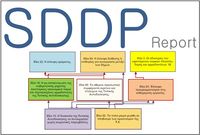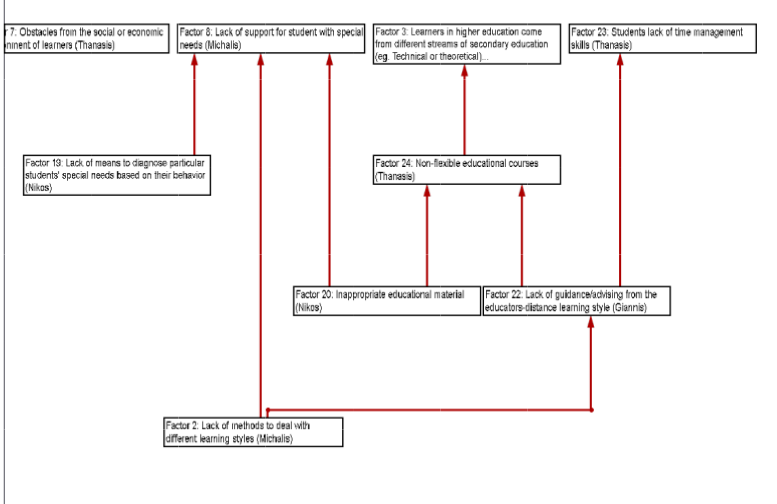E-Hoop SDDP Greece: Difference between revisions
(change of template) |
|||
| Line 20: | Line 20: | ||
==Executive Summary== | ==Executive Summary== | ||
The Structured | The [[Structured Democratic Dialogue]] [[Co-Laboratory|co-laboratories]] were organized with aim to analyze the needs of the intended users with respect to their learning needs, as well as their needs with regards to the [[E-Hoop]] project platform. The intention was to identify obstacles that prevent learners from benefiting maximally from their current educational institution due to differences (disabilities, socioeconomic background etc.). | ||
The [[Hellenic Open University]] organized on the 10th of March 2014 a [[Co-Laboratory]] in order to accumulate the collective wisdom of experts regarding the obstacles that limit learners from benefiting maximally from their respective educational institutions because of their differences. The [[Co-Laboratory]] was attended by 8 participants. The process was supported by [[Cogniscope 3]]. | |||
| Line 51: | Line 52: | ||
The workshop was mainly facilitated by [[Yiannis Laouris]] and [[Katerina Fotiou]] ([[Cyprus Neuroscience and Technology Institute |CNTI]]). | The workshop was mainly facilitated by [[Yiannis Laouris]] and [[Katerina Fotiou]] ([[Cyprus Neuroscience and Technology Institute |CNTI]]). | ||
In sum, the participants of the dialogue reported their satisfaction that they had the opportunity to exchange ideas via the structured dialogue process which empowered them to identify the obstacles that can be a barrier to students to benefit on the maximum from the educational institutions due to their differences. <br> | In sum, the participants of the dialogue reported their satisfaction that they had the opportunity to exchange ideas via the structured dialogue process which empowered them to identify the obstacles that can be a barrier to students to benefit on the maximum from the educational institutions due to their differences. <br> | ||
==Participants== | ==Participants== | ||
Latest revision as of 01:37, 25 July 2023
|
Executive Summary
The Structured Democratic Dialogue co-laboratories were organized with aim to analyze the needs of the intended users with respect to their learning needs, as well as their needs with regards to the E-Hoop project platform. The intention was to identify obstacles that prevent learners from benefiting maximally from their current educational institution due to differences (disabilities, socioeconomic background etc.).
The Hellenic Open University organized on the 10th of March 2014 a Co-Laboratory in order to accumulate the collective wisdom of experts regarding the obstacles that limit learners from benefiting maximally from their respective educational institutions because of their differences. The Co-Laboratory was attended by 8 participants. The process was supported by Cogniscope 3.
The Triggering Question (TQ) of the first workshop was:
"What are typical obstacles that limit learners from benefiting maximally from their respective educational institutions because of their differences?"
In response to the TQ, the 8 participants came up with 24 ideas, which were categorized in 5 clusters. Following the voting process, 19 ideas received one or more votes and were structured to create the influence MAP shown below.
According to the participants of this workshop, the ideas that appear to be the most influential were:
- Idea #2: Lack of different learning styles
- Idea #20: Inappropriate educational material
- Idea #22: Lack of guidance/advising from the educators
- Idea #19: Lack of means to diagnose particular students' special needs based on their behaviours
- Idea #24: Non-flexible educational courses
- Idea #7: Obstacles from the social or economic environment of learners
- Idea #8: Lack of support for student with special needs
- Idea #3: Learners in higher education come from different streams of secondary education
- Idea #23: Students lack of time management skills
The workshop was mainly facilitated by Yiannis Laouris and Katerina Fotiou (CNTI).
In sum, the participants of the dialogue reported their satisfaction that they had the opportunity to exchange ideas via the structured dialogue process which empowered them to identify the obstacles that can be a barrier to students to benefit on the maximum from the educational institutions due to their differences.
Participants
| Name |
|---|
| Alexandros T. |
| Michalis |
| Christos |
| Lefteris |
| Alexandros L. |
| Giannis |
| Thanasis |
| Nicos |

